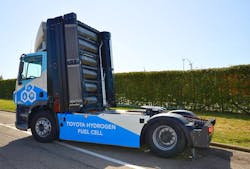Toyota Partners with Coca-Cola and Air Liquide for Heavy Duty Hydrogen-Powered Truck Project
Toyota and Coca-Cola have begun testing a hydrogen-powered truck as part of the beverage company’s supply operations.
The hydrogen-powered truck utilizes Toyota fuel cell modules, which combine hydrogen and oxygen molecules into water to generate electricity, with water as the only tailpipe emission. Moreover, fast refueling ensures high utilization rates.
Air Liquide, a producer and distributor of low-carbon and renewable hydrogen, is supplying the hydrogen from renewable sources for the project. The partnership highlights the significance of concurrently developing vehicles and infrastructure to strengthen a more sustainable society.
Through this hydrogen project, Toyota aims to support the decarbonization of heavy-duty road transport, which accounts for a quarter of European freight transport based on ton-kilometers performed. Commercial trucks’ usage patterns and their demand for large volumes of hydrogen position them as key contributors to developing sustainable hydrogen infrastructures.
The collaboration also demonstrates Toyota’s intent to support and contribute to the establishment of carbon-neutral societies in Europe and beyond.
"We are expanding the use of our Toyota Fuel Cell Module beyond passenger cars into trucks, buses, coaches, trains, boats, near-shore and short-sea vessels, stationary generators, and so on. The insights gained from these proof of concepts will serve as crucial milestones on our path toward achieving zero tailpipe carbon emissions in our logistics operations by 2040," said Thiebault Paquet, VP of R&D at Toyota Motor Europe.
